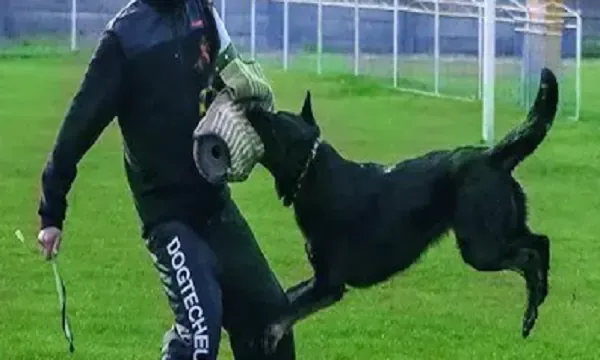What is the problem with punishment in dog training?
During the current article, we will review a
scientific study confirming that violent methods of dog training endanger the
animal's well-being and psychological state and increase the secretion of
stress hormones, let's get to know the details.
Scientists disagree on when humans domesticated
dogs. Some studies have suggested that domestication began about 11,000 years
ago, while others point to a much more distant date back to about 28,000 years
ago.
However, what is consistent between these studies
is that dogs are among the best domesticated animals.
Its benefits are surprisingly diverse, as it gives
children better social skills, and it also plays an important role in hunting
and guarding operations.
In order to fulfill their increasingly important
role as domesticated animals, dogs need arduous training to behave in an
appropriate manner, commensurate with the nature of the lives of human families.
And these exercises include: teaching dogs to submit to their owners,
walking quietly in the streets, toilet training, and other exercises.
The methods vary in the training of these animals,
among the methods is the use of the principle of punishment or reward.
However, voices from within the scientific
community are rising to prevent dogs from being punished, stressing that using
this method endangers animal welfare.
A new study published in the journal PLOS ONE
indicates that dogs trained using punishments for incorrect behavior show
evidence of increased levels of stress hormones, compared to dogs trained in
reward-based methods.
Researchers carried out a study on 92 dogs from 7
dog training schools in Portugal, and those schools used either negative
stimuli as punishment for dogs, or reward training or a mixture of the two.
The
researchers filmed training sessions and examined saliva samples for the stress hormone cortisol.
Dogs trained using violent or mixed methods showed
more stress-related behaviors, such as bending and yelling, and greater
increases in cortisol levels after training than did reward-trained dogs.
The authors also conducted cognitive bias testing
in an unfamiliar setting outside the usual dog training environment with 79
dogs, aiming to measure their underlying emotional state.
They found
that dogs from violent schools respond more pessimistically to ambiguous
situations compared to dogs that receive mixed or reward-based training.
The results of the study confirm that the use of
punishment in dog training undoubtedly endangers animal welfare.
This paper is one of the first large-scale studies
of dogs domesticated in a real training environment, using the types of
training methods typically applied in dog training schools.
The researchers suggest banning the use of violent
training; Because of its negative impact on the well-being of dogs.
The study reveals that the emotional states of
animals are affected by the experiences of immediate reward or punishment in
the short term, as well as by the cumulative experience of the type of training
in the long term.
And then
repeated exposure to aversive stimuli will greatly affect the psycho-emotional
state of those animals.
Stress hormones are likely to affect the health of animals as well, says
Anna Catarina Vieira de Castro, an animal researcher and author of the study.
De Castro adds that the effect of cortisol on
humans is well known; It leads to a wide range of diseases, which can apply to
dogs as well, noting that work on that study took 4 full years.
She continues: We hope that the results will help
in the development of recommendations and guidelines for dog training; Training
is an unregulated activity on a large scale all over the world.
De Castro believes it is important to inform the
public through reliable scientific sources of the impact of the methods they
choose to train their dogs, adding, based on an animal welfare perspective.
we advise people to use the methods
that have the least negative impact on the well-being of dogs, which our study
showed to be methods based on animal welfare. Rewards, not punishment.
Key words:
dog training punishment reward methods stress hormone cortisol

